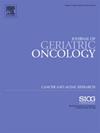Patterns of social support among older adults with cancer and associations with patient-reported outcomes: A latent class analysis
IF 3
3区 医学
Q3 GERIATRICS & GERONTOLOGY
引用次数: 0
Abstract
Introduction
Social support can play an important role in the care of older adults living with cancer. However, different patterns of social support, such as emotional, instrumental, informational, appraisal, and giving support need to be considered to facilitate adjustments to cancer. This study aimed to explore the distinct patterns of social support among older adults with cancer and examine the socio-demographic variables and patient-reported outcomes that may be associated with patterns of social support.
Materials and Methods
Data were used from 7,097 respondents from the Experience of Cancer Patients in Transition Study administered in 2016. Socio-demographic variables included sex, age, marital status, place of residence, and income, alongside patient-reported outcomes. Latent class analysis was used to identify distinct social support patterns. Multivariable multinomial regression models were then used to determine predictors of these latent classes.
Results
Three latent classes of social support were identified: “low,” “moderate,” and “high” emotional support. Having “high” emotional support did not necessarily mean patients had the highest levels of all social support attributes. For example, the “low” emotional support group exhibited the highest appraisal support (16 % of class members) and giving support (42 % of class members). While most socio-demographic variables were not significant predictors of the latent classes, statistically significant differences were found in emotional health.
Discussion
Assessing social support requires consideration of the different patterns of support, as the presence of one attribute (e.g., appraisal or giving support) does not ensure the coverage of others (e.g., emotional support). Comprehensive assessments of these varied support patterns are recommended to better address the psychological and emotional challenges associated with a cancer diagnosis and to inform subsequent interventions.
老年癌症患者的社会支持模式及其与患者报告结果的关联:潜在分类分析
社会支持在老年癌症患者的护理中扮演着重要的角色。然而,需要考虑不同的社会支持模式,如情感、工具、信息、评价和给予支持,以促进对癌症的适应。本研究旨在探讨老年癌症患者的不同社会支持模式,并检查可能与社会支持模式相关的社会人口统计学变量和患者报告的结果。资料与方法数据来自2016年实施的“癌症患者过渡期体验研究”的7097名受访者。社会人口变量包括性别、年龄、婚姻状况、居住地和收入,以及患者报告的结果。潜在类别分析用于识别不同的社会支持模式。然后使用多变量多项回归模型来确定这些潜在类别的预测因子。结果发现社会支持的潜在等级为“低”、“中”、“高”。拥有“高”的情感支持并不一定意味着患者拥有所有社会支持属性的最高水平。例如,“低”情感支持组表现出最高的评价支持(占班级成员的16%)和给予支持(占班级成员的42%)。虽然大多数社会人口统计变量不是潜在类别的显著预测因子,但在情绪健康方面发现了统计学上显著的差异。评估社会支持需要考虑不同的支持模式,因为一种属性的存在(例如,评价或给予支持)并不能确保其他属性的覆盖(例如,情感支持)。建议对这些不同的支持模式进行全面评估,以更好地解决与癌症诊断相关的心理和情感挑战,并为后续干预提供信息。
本文章由计算机程序翻译,如有差异,请以英文原文为准。
求助全文
约1分钟内获得全文
求助全文
来源期刊

Journal of geriatric oncology
ONCOLOGY-GERIATRICS & GERONTOLOGY
CiteScore
5.30
自引率
10.00%
发文量
379
审稿时长
80 days
期刊介绍:
The Journal of Geriatric Oncology is an international, multidisciplinary journal which is focused on advancing research in the treatment and survivorship issues of older adults with cancer, as well as literature relevant to education and policy development in geriatric oncology.
The journal welcomes the submission of manuscripts in the following categories:
• Original research articles
• Review articles
• Clinical trials
• Education and training articles
• Short communications
• Perspectives
• Meeting reports
• Letters to the Editor.
 求助内容:
求助内容: 应助结果提醒方式:
应助结果提醒方式:


